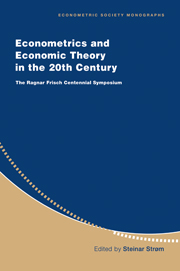Book contents
- Frontmatter
- PART I RAGNAR FRISCH AND HIS CONTRIBUTIONS TO ECONOMICS
- 1 Ragnar Frisch at the University of Oslo
- 2 Ragnar Frisch and the Foundation of the Econometric Society and Econometrica
- 3 The Contributions of Ragnar Frisch to Economics and Econometrics
- PART II UTILITY MEASUREMENT
- PART III PRODUCTION THEORY
- PART IV MICROECONOMIC POLICY
- PART V ECONOMETRIC METHODS
- PART VI MACRODYNAMICS
- PART VII MACROECONOMIC PLANNING
- Author Index
- Subject Index
3 - The Contributions of Ragnar Frisch to Economics and Econometrics
from PART I - RAGNAR FRISCH AND HIS CONTRIBUTIONS TO ECONOMICS
Published online by Cambridge University Press: 05 January 2013
- Frontmatter
- PART I RAGNAR FRISCH AND HIS CONTRIBUTIONS TO ECONOMICS
- 1 Ragnar Frisch at the University of Oslo
- 2 Ragnar Frisch and the Foundation of the Econometric Society and Econometrica
- 3 The Contributions of Ragnar Frisch to Economics and Econometrics
- PART II UTILITY MEASUREMENT
- PART III PRODUCTION THEORY
- PART IV MICROECONOMIC POLICY
- PART V ECONOMETRIC METHODS
- PART VI MACRODYNAMICS
- PART VII MACROECONOMIC PLANNING
- Author Index
- Subject Index
Summary
Ragnar Frisch opened his 1926 article “On a Problem in Pure Economics” with the following statement:
Intermediate between mathematics, statistics, and economics, we find a new discipline which, for lack of a better name, may be called econometrics.
Econometrics has as its aim to subject abstract laws of theoretical political economy or “pure” economics to experimental and numerical verification, and thus to turn pure economics, as far as possible, into a science in the strict sense of the word.
Thus we are here to celebrate the centennial of the birth of the founder of our subject, who gave it its name and founded its journal.
Rather regrettably, but perhaps inevitably, the term “econometrics” has come to have a narrower meaning than Frisch originally intended: the study of statistical methods for the application of economic models. For that reason, the title of this chapter, instead of referring just to Frisch's contributions to econometrics in the narrower sense - which were many and profound - also refers to his contributions to economics, by which may be understood economic theory and policy, to which he made a large number of important contributions. I shall necessarily be quite selective, and rather than try to survey his huge output, which could be done only in a superficial way, I shall concentrate on what seem to me the most important and lasting of his contributions.
- Type
- Chapter
- Information
- Econometrics and Economic Theory in the 20th CenturyThe Ragnar Frisch Centennial Symposium, pp. 58 - 108Publisher: Cambridge University PressPrint publication year: 1999
- 3
- Cited by



